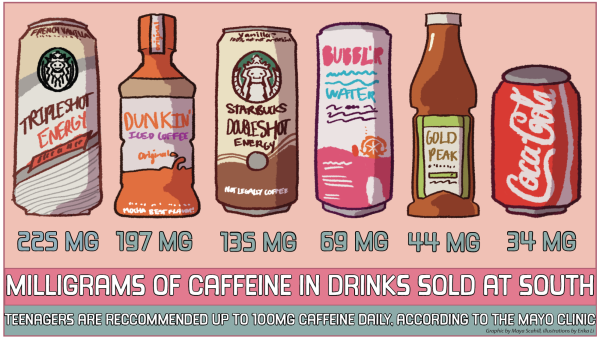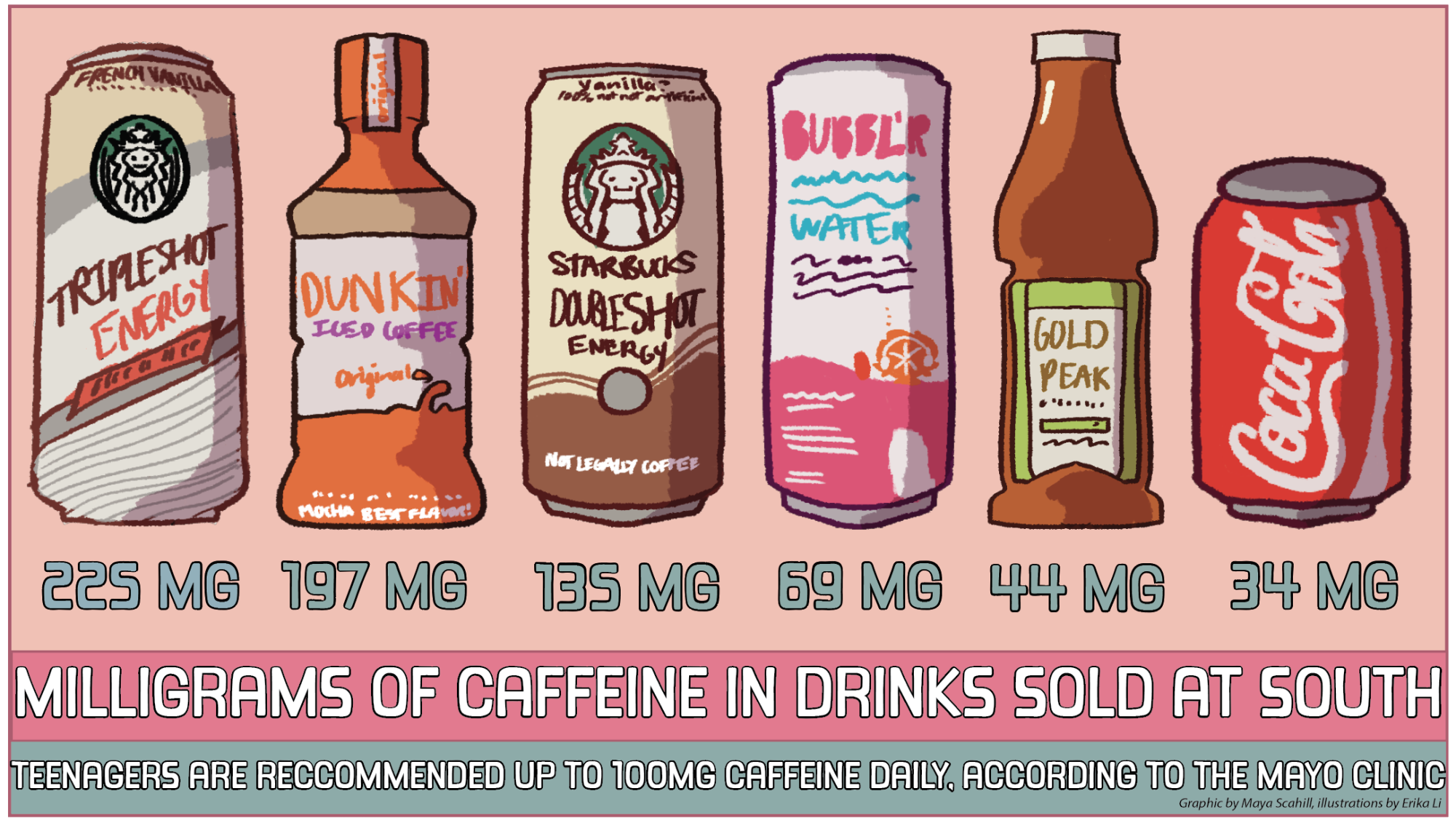
Nestled within the humming halls of South lies a compelling habit that awakens the minds of young students: caffeine. Coursing through their veins, it charges their ambitions and sharpens their focus. As the morning sun beams a golden glow across the buzzing school, the fresh aroma of warm coffee and the clinking of energy drinks fill the air, energizing students’ sleepy souls. In the early hours of each school day, students, including sophomore Sean Burke, begin their transition from groggy to alert.
Celsius, an energy drink, is Burke’s main source of caffeine. After drinking Celsius, Burke is able to double down on school work productively and efficiently, he stated. The once daunting mountain of assignments becomes a mere hill, easily conquerable with each sip.
“[Caffeine] makes me [feel] more awake and able to get [things] done,” Burke said. “It can help you lock in and focus, especially if you’re busy, haven’t gotten a lot of sleep, [or are] thinking about other things. You can also get work done more productively.”
Though caffeine can be valuable during school struggles, it can also negatively affect your personality, Burke expressed. When drinking it frequently, he could see that his energy was too high for his surroundings, or that it was actually hindering him from completing work.
“After [the caffeine] wears off, it is easy to [become] an irritable person,” Burke said. “While you’re on it, you can be a lot more hyper than what’s acceptable for you at the moment in time.
If you’re letting yourself drink multiple energy drinks a day, it can have a lot of negative effects on your attitude and your energy.”
Burke began drinking caffeine in his freshman year as a result of the overwhelming workload he was receiving, which was more than he had anticipated. In order to maintain his grades while trying to get enough sleep and participating in more activities, he turned to caffeine. Considering 70 percent of students at South drink caffeine at least once a week, according to a nonscientific survey conducted by The Oracle, Burke is not alone in his caffeine intake.
“[The effects of caffeine are] negative in terms of getting sleep,” Burke said. “It’s a feedback loop. I would end up getting less sleep, so later [I would] drink more caffeine causing me to feel better, but it also ended up ruining my sleep schedule even more.”
Caffeine ingested- edt as early as lunchtime can stay in your system until much later that night, affecting the quality of sleep you get, Alan Esser, South social worker, confirmed. As the next day approaches, you drink more caffeine to compensate for the previous night’s unfulfilling sleep, creating a cycle of dependency, Esser explained.
“Students go to bed not knowing that they’re still keyed up from the caffeine and then they don’t sleep well,” Esser said. “I drink coffee every morning, but I am not the type that can drink it in the afternoon [because] I get all jittery. I worry [about] teenagers in terms of their sleep and how [caffeine] impacts them.”
High school life, with its various extracurricular pursuits and commitments, demands a plentiful amount of energy, Burke addressed. Late-night studying, sports practices, and other endeavors left him wavering on the edge of exhaustion. Caffeine offered a temporary reprieve from fatigue, reviving tired minds and enlivening weary spirits, he added.
“A lot of students feel really overwhelmed by their workload,” Burke said. “They’re getting a lot of homework assigned to them [while also being] involved in a lot of activities, [and they] end up getting less sleep than [they’d] like to. There’s [an] expectation to do well in school, [so] a lot of people turn to caffeine to stay awake, stay focused during class, [and] get their homework done productively.”
Junior Archana Stoeterau’s academic workload and Varsity Cheerleading leaves little free time for her, thus causing her to complete her homework in the late hours of the night. Stoeterau compensates for her lack of sleep by drinking a caffeinated drink every day, usually exceeding 200 milligrams of caffeine.
“I’m very dependent on caffeine to stay awake in class and get my work done,” Stoeterau said. “I do a sport every single day after school and I also have a lot of homework. By the time I finish all that, eat dinner and shower, it’s so late that I end up getting six hours of sleep on good days.”
Burke and Stoeterau are not alone in their dependence on caffeine, considering 18 percent of South students consider themselves dependent on caffeine. In addition, 73 percent of students believe caffeine dependence is a problem at South.
Overwhelming workloads is one of many factors affecting students’ quality of sleep, Esser acknowledged. Esser has witnessed the effect of long school days paired with hours of homework, resulting in students’ often struggle of finding time for socialization. This leads them to stay up late while they catch up with friends. Because of the little hours they slept the previous night, students gravitate towards caffeinated drinks, Esser continued.
“I joke with my students [that] I went to bed at nine o’clock in high school, and they laugh at me, but, you have to put it in perspective,” Esser said. “We didn’t have cell phones. We didn’t have laptops, Netflix or YouTube. If I went to high school now I wouldn’t [go] to bed at nine o’clock either.”
Although many of the components encouraging caffeine use are out of students’ control, Esser believes there are ways to foster a healthier sleep cycle. Through bettering executive functioning skills of planning one’s schedule out, students can strive to find time in their busy schedules for sleep, Esser added.
“In high school, sleep is the most important thing you can get,” Esser said. “For everything. For your mental health. For your sanity.”
As the sun began to descend, the impacts of caffeine soon faded away, leaving behind a sense of restlessness and exhaustion. With crashes imminent, Burke signified the importance of balancing his caffeine intake.
“It was an unhealthy reliance at some point,” Burke said. “At the end of the day, [caffeine] has negative health effects if you’re drinking a lot of it. It is just important to strike a good balance, moderate yourself, and use caffeine more as a tool than let it take over.”



